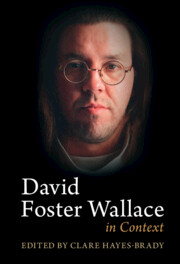Book contents
- David Foster Wallace in Context
- David Foster Wallace in Context
- Copyright page
- Contents
- Figures
- Contributors
- Acknowledgments
- Abbreviations
- Introduction
- Part I Contexts
- Part II Ideas
- Chapter 10 David Foster Wallace and Attention
- Chapter 11 After Analysis
- Chapter 12 Perfectionism and the Ethics of Failure
- Chapter 13 The Pragmatist Possibility in David Foster Wallace’s Writings
- Chapter 14 A Tale of Two Theses
- Chapter 15 Free Will and Determinism
- Chapter 16 David Foster Wallace’s Mathematics of the Infinite
- Chapter 17 David Foster Wallace and Existentialism
- Chapter 18 David Foster Wallace and Religion
- Chapter 19 Mr. Consciousness
- Part III Bodies
- Part IV Systems
- Works by David Foster Wallace
- Bibliography of Secondary Sources
- Index
Chapter 12 - Perfectionism and the Ethics of Failure
from Part II - Ideas
Published online by Cambridge University Press: 18 November 2022
- David Foster Wallace in Context
- David Foster Wallace in Context
- Copyright page
- Contents
- Figures
- Contributors
- Acknowledgments
- Abbreviations
- Introduction
- Part I Contexts
- Part II Ideas
- Chapter 10 David Foster Wallace and Attention
- Chapter 11 After Analysis
- Chapter 12 Perfectionism and the Ethics of Failure
- Chapter 13 The Pragmatist Possibility in David Foster Wallace’s Writings
- Chapter 14 A Tale of Two Theses
- Chapter 15 Free Will and Determinism
- Chapter 16 David Foster Wallace’s Mathematics of the Infinite
- Chapter 17 David Foster Wallace and Existentialism
- Chapter 18 David Foster Wallace and Religion
- Chapter 19 Mr. Consciousness
- Part III Bodies
- Part IV Systems
- Works by David Foster Wallace
- Bibliography of Secondary Sources
- Index
Summary
While Wittgenstein has become recognized as the most overt philosophical influence in Wallace’s writing, he was by no means the only one. Wallace was heavily indebted to numerous philosophical schools, and was particularly influenced by the linguistic turn, and the post-philosophical ideas of Rorty and Cavell. Wallace attended classes with Stanley Cavell at Harvard University, and his influence on Wallace has been traced in recent scholarship by Adam Kelly and others. This chapter offers guidance on reading Wallace through the lens of what Cavell referred to as “moral perfectionism” – the drive toward constant moral improvement, an endless iterative repetition of self-discovery, “a process of moving to, and from, nexts” – which Wallace explored and embodied in different ways throughout the work. The recurrent theme of heroic attention as a virtuous struggle arguably owes a debt to Cavell’s concept of acknowledging the other as a moral good, and the anti-teleological drive of Wallace’s oeuvre fits neatly with Cavell’s imaginary of unending toil toward the good. Using the Pop Quiz structure of “Octet” as a point of departure and focusing more broadly on the dialogic imperative of Brief Interviews with Hideous Men as a whole, this chapter argues that Wallace’s work, with its sense of repeating shapes, themes and patterns, and especially the persistent figurations of failure and regrouping, is best read as a series of iterations of perfectionism, a career-long fantasy of searching for the good in the knowledge that it will not be attained.
- Type
- Chapter
- Information
- David Foster Wallace in Context , pp. 129 - 138Publisher: Cambridge University PressPrint publication year: 2022

